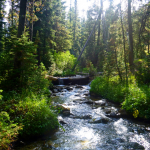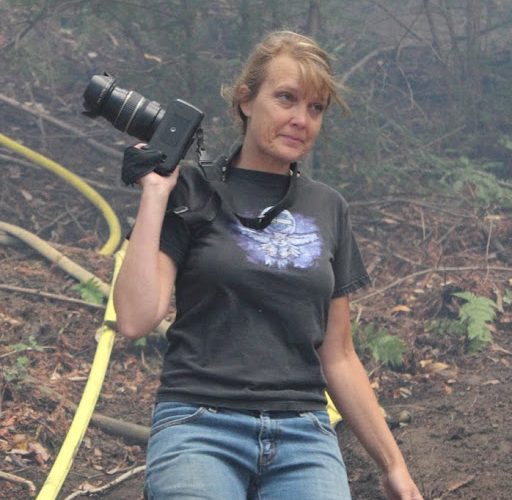By Robert Arne
Five years ago, I was a poor tax accountant who lived with a city-loving wife in Santa Clara, in a cheap rental I had obtained for $169k. Yet I dreamt that I might “live deliberately” as Henry David Thoreau did in 1840’s Massachusetts: “…to front only the essential facts of life, and see if I could not learn what it had to teach, and not, when I came to die, discover that I had not lived.” The prospective site of my isolation was not Walden Pond, but spare land behind my rental property up Scenic Drive in Ben Lomond. These Santa Cruz mountains had once been filled by thousands of tiny shacks for those who wanted hunting and private life. My mother even gave me $5,000 to pursue dreams Thoreau lauded: “I never found the companion that was so companionable as solitude.”
Seeking solitude in a location that blocked no one’s view and bordered on no one’s property, I began construction alone on a 6 by 14 square foot shack, under the 120 square foot permitting limit. Should this be the privilege of the monied elite? I knew nails, windows and roofing well enough to make it all safe. I even poured a foundation, and all went well until I built a ground-hugging staircase to the street below. Without warning or conversation, someone turned to the County complaining that I was blocking the street and building an illegal granny unit. Though this man didn’t live near my house, he even posted signs on trees encouraging neighbors to echo his wrath to the authorities. I have forgiven this man for costing me $10,000 and a heap of troubles, but I may write him up as a communist mole leading people to death in the Cultural Revolution.
“Rather than love, than money, than fame,’ wrote Thoreau, “give me truth.” In the moment of truth a “red tag” provides, I met the gentle inspector who showed up at my property and hinted that he probably would have ignored me but for the vociferous neighbor. From a distance, he noted that I had an unpermitted deck on the main house and that I had to:
Recognize the construction of 260 sq. ft. uncovered deck & stairs.
Reduce the height of the existing 109 sq. ft. shed such that it does not exceed 10 feet and detach deck framing from the shed.
Construct support for the detached portion of the deck.
Recognize electrical work at the shed.
Countless times, I told inspectors that I wanted a tiny shack and not a nuclear power plant, coal mine or slaughterhouse. I soon found that amateur drawings would not satisfy inspectors even if they could look at an existing shed to see if it was safe. I hired someone to make drawings and he managed to talk the city out of requiring thousands of dollars of surveying work and soil testing.
Then I discovered that I had to tear down two year old decking because it bridged a septic tank. These tanks are the key to regulation: I knew that it would be illegal to expand my house without over $20,000 of sewer work. But who was bothered by the deck and neither deck nor shack had plumbing? To no one’s benefit, I tore down a deck.
The Building Department sent me to Environmental Planning, which forced me to swear that I would never finish the interior of the shack or use it for housing. Acts like these multiplied thousand times over, keeping a thousand people homeless who might have lived in shacks like this.
It seemed strange for the government document to suggest “detach deck framing from the house” because detaching decking from concrete foundation would only weaken the decking. What matters is safety when regulations are at stake? If the decking is attached and the building is too tall, I would have to seek permits; the Building Department, (utterly indifferent to costs) politely asked me for engineering drawings and calculations on a 109 foot shed. So I shelled out $2,500 to an engineer who submitted a list of mathematical calculations that everyone clearly ignored, but it made inspection appear thorough.
Squabbling with the city over plans cost a year of time and I had to pay $2,000 for shed permits and over a thousand dollars to renew permits when I couldn’t afford expenses of permitting and construction to satisfy permitting requirements. I could only finish removing electrical work and hiring a general contractor to complete the project to code when I borrowed money from the realtor to sell off the whole property. The $5,000 shack and decking cost over $17,000. The inspector signed off without hassle and I wept. Thoreau understood what delay and expense meant: “The cost of a thing is the amount of what I will call life, which is required to be exchanged for it, immediately or in the long run.”
Good and kind people populate Building Departments and pass regulations for health and safety. Yet their regulation destroys the “tonic of wildness” Thoreau lauded and the urban life doesn’t help those who step to the music of “a different drummer”. It is hard to “suck out all the marrow of life” sitting long hours waiting for regulators and trying to prepare their paperwork; and I didn’t finish the novel I had planned to write in the shack. Thoreau had famously protested the Mexican War by refusing to pay taxes, and he wrote about his night in jail for civil disobedience. If the government can violate conscience with wars, can it not also violate conscience with regulations to keep small shacks too expensive for commoners?
Tax disobedience would certainly cost me my Enrolled Agent’s license and I wonder if holding signs in front of the County Offices would have an effect? Would the homeless march against building codes? Would the rich enable poor renters to live nearby, or should they be crowded into urban public housing projects? Would locals who do vote, support urban idealists who don’t vote locally? Would urban planners want us all to live in crowded cities using public transportation? Do the interests of environmentalists and wealthy not-in-my backyarders come together to defeat the freedom of solitude in nature?
Over time, my investments paid off and I left my city wife behind to buy my Emersonian dream house in the Santa Cruz Mountains where I can do Buddhist meditation and ponder the fundamental unity of religions. Wealth now makes me lucky enough to: “Live in each season as it passes; breathe the air, drink the drink, taste the fruit, and resign yourself to the influence of the earth.”



















